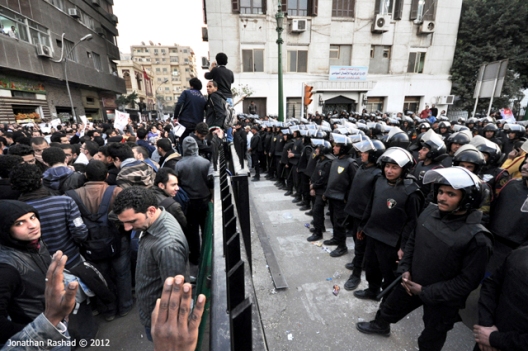 With Prime Minister Hazem El-Beblawy’s cabinet finalizing a new protest law that has been passed on to interim president, Adly Mansour, for his approval, reactions to the draft have varied. From within the cabinet itself, Deputy Prime Minister Ziad Bahaa-Eldin fought the law/ Al-Masry Al-Youm reported that a verbal altercation took place between Bahaa-Eldin and interior minister Mohamed Ibrahim over the cabinet’s approval of the law.
With Prime Minister Hazem El-Beblawy’s cabinet finalizing a new protest law that has been passed on to interim president, Adly Mansour, for his approval, reactions to the draft have varied. From within the cabinet itself, Deputy Prime Minister Ziad Bahaa-Eldin fought the law/ Al-Masry Al-Youm reported that a verbal altercation took place between Bahaa-Eldin and interior minister Mohamed Ibrahim over the cabinet’s approval of the law.
Read EgyptSource’s in-depth analysis of the law here.
LIBERAL/SECULAR PARTIES
Ziad Bahaa-Eldin: According to Al-Masry Al-Youm, Bahaa-Eldin warned against approving the law, describing it as a serious turning point in Egypt’s transitional phase. He said that the law could harm the public’s perception of the interim government and its current roadmap.
Emad Gad: Deputy head of the Egyptian Democratic Party, Emad Gad, welcomed the law, but added that it should only be applied temporarily as a means of handling the transitional phase the country is in. He said that the law should be repealed when the state of emergency is lifted.
Rifa’at al-Said: Tagammu Party leader Rifa’at al-Said spoke positively about the law, pointing to the fact that all democratic countries in the world have a protest law. He also recalled Egypt’s 1923 constitution which included an article guaranteeing peaceful protest. At the time, he said, Saad Zaghloul determined that a serious fine should be imposed on all who take part in non-peaceful protest.
Wahid Abdel Meguid: National Salvation Front leader Wahid Abdel Meguid said that while he does not reject the law in principle, there are major amendments that need to be made, particularly in regards to Article 6 (notifying police) so as not to restrict people’s rights.
George Ishaq: Politician and activist George Ishaq was critical of the law, saying that it is severe, and called on reduced punishments, whether fines or imprisonment, in the draft law.
Abdel Aziz Hegazy: Former prime minister Abdel Aziz Hegazy called for the application of the new law, saying that it is necessary as the country can no longer withstand worker strikes, protests and sit-ins. He added that the law should be applied to all who participate in non-peaceful protests.
ISLAMIST PARTIES
Jama’a al-Islamiya: The Jama’a al-Islamiya’s Construction and Development Party announced its refusal of the protest law. In a statement on Wednesday, the party said that the law was a return to the practice of laws drafted with the sole purpose of silencing the opposition. Like the Nour Party, they also criticized the discussion of the law in the absence of an elected legislative body.
Nour Party: The Salafi Nour Party has called on Mansour not to pass the law before presenting its details in a national dialogue. Party head, Younes Makhioun, described the law as “dangerous” and called on Mansour to wait until an elected parliament to decide on the legislation. He added that the interim government’s legislative powers should be limited to exceptional circumstances and should be used at a minimum, only in urgent situations.
Yousry Hammad: Watan party’s Yousry Hammad was also critical of the law saying that it contradicts international law. He added, “We live in a country where peaceful protesters are killed or imprisoned.” He also expressed his refusal of any laws issued by an unelected government.
YOUTH AND HUMAN RIGHTS MOVEMENTS
Revolutionary Forces Bloc: Also rejecting the draft, the Revolutionary Forces Bloc said that the law would enable the return of the police state, and would detract from the gains of the January 2011 revolution. They warned that passing the law could lead to a clash between the state and revolutionary forces, adding that they reject any trade-offs between freedom and security. Safwat Omran, the group’s general coordinator echoed ANHRI’s statement, saying that the use of force to restrict freedoms was a tactic often used by the Mubarak regime.
Arab Network for Human Rights Information: Human rights organization, ANHRI was extremely critical of the draft law. The organization issued a statement rejecting the draft law, saying that it restricts citizens’ rights and freedoms. ANHRI also likened the interim government’s draft to legislation passed under former president, Hosni Mubarak’s, autocratic regime, as well as similar protest laws discussed both by the Supreme Council of the Armed Forces and Mohamed Morsi’s government.
April 6: The April 6 Youth Movement (Democratic Front) rejected the draft law saying that it not only restricts freedoms, but also pointed to its negative impact on state security reform and transitional justice in Egypt.
Tamarod: Tamarod founding member Mohamed Abdel Aziz said that any law limiting the rights of peaceful protest, earned by Egyptians on January 25 and June 30, is “unjust”
Image: Photo: Jonathan Rashad
